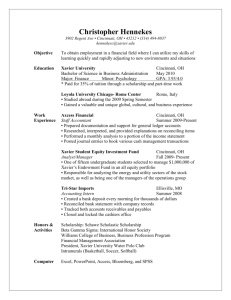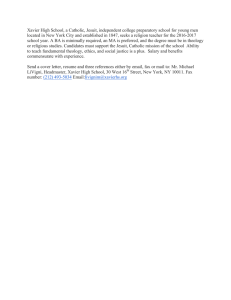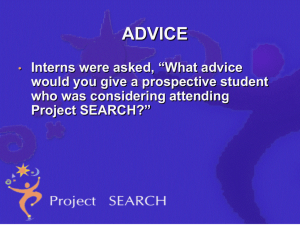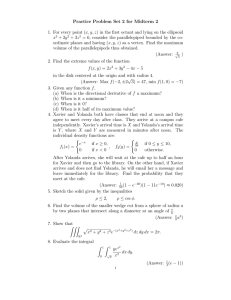Commencement Address, Xavier University, 2001 .
advertisement
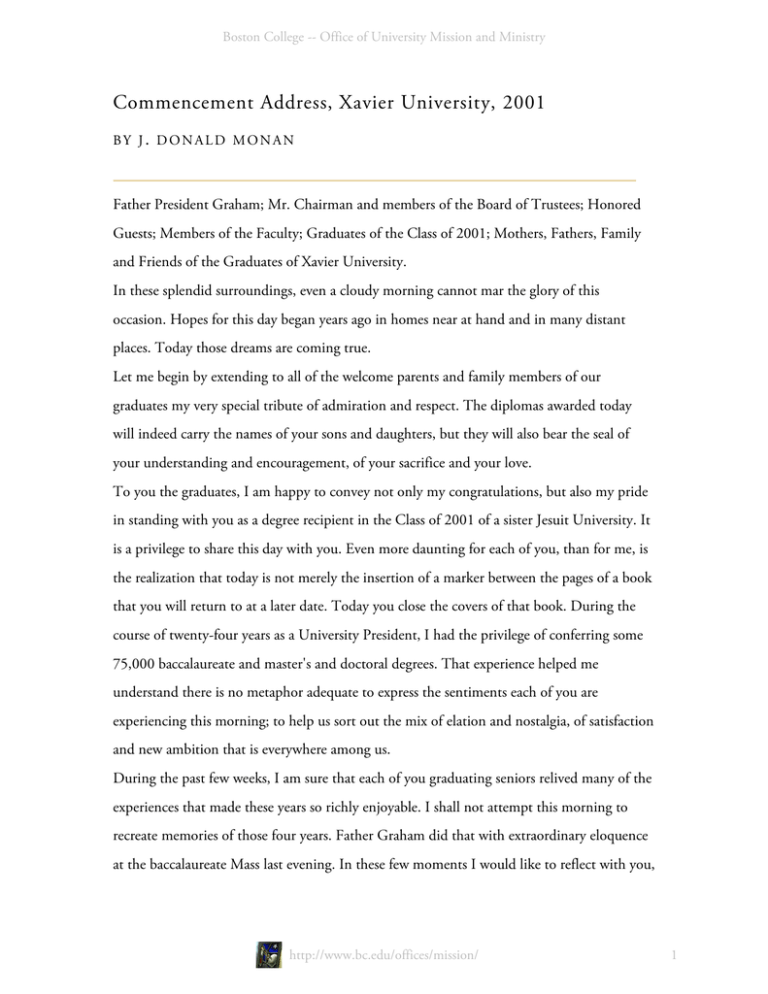
Boston College -- Office of University Mission and Ministry Commencement Address, Xavier University, 2001 BY J. DONALD MONAN Father President Graham; Mr. Chairman and members of the Board of Trustees; Honored Guests; Members of the Faculty; Graduates of the Class of 2001; Mothers, Fathers, Family and Friends of the Graduates of Xavier University. In these splendid surroundings, even a cloudy morning cannot mar the glory of this occasion. Hopes for this day began years ago in homes near at hand and in many distant places. Today those dreams are coming true. Let me begin by extending to all of the welcome parents and family members of our graduates my very special tribute of admiration and respect. The diplomas awarded today will indeed carry the names of your sons and daughters, but they will also bear the seal of your understanding and encouragement, of your sacrifice and your love. To you the graduates, I am happy to convey not only my congratulations, but also my pride in standing with you as a degree recipient in the Class of 2001 of a sister Jesuit University. It is a privilege to share this day with you. Even more daunting for each of you, than for me, is the realization that today is not merely the insertion of a marker between the pages of a book that you will return to at a later date. Today you close the covers of that book. During the course of twenty-four years as a University President, I had the privilege of conferring some 75,000 baccalaureate and master's and doctoral degrees. That experience helped me understand there is no metaphor adequate to express the sentiments each of you are experiencing this morning; to help us sort out the mix of elation and nostalgia, of satisfaction and new ambition that is everywhere among us. During the past few weeks, I am sure that each of you graduating seniors relived many of the experiences that made these years so richly enjoyable. I shall not attempt this morning to recreate memories of those four years. Father Graham did that with extraordinary eloquence at the baccalaureate Mass last evening. In these few moments I would like to reflect with you, http://www.bc.edu/offices/mission/ 1 Boston College -- Office of University Mission and Ministry not on another lesson in economics or world politics or in art, but rather on the message of the university itself. For beyond all the academic lessons that you have learned so well, there has been a silent message in these classrooms and hushed libraries -- a message that is not the object of any discipline or department, but that has the power to color every frame of the future that will be yours. Indeed, the most fundamental message of the university is not audible in words. But that message is the inspiration that raised the walls of these buildings decades ago. It is the same message that is graphically displayed by all of us as we assemble on this glorious spring day. Our presence on this campus is a massive affirmation of the importance of human intelligence and of the importance of developing it. For all of you and your families, that affirmation has entailed a significant financial investment. But even more, it has meant an investment of yourself -- of your precious years and energies and interests -- in expanding your intellectual powers as broadly and deeply, and at times as narrowly and precisely, as your professors asked of you. This respectful recognition of the importance of human intelligence that is the first message of the university, was captured for me in a very striking way years ago in three short words of the great Medieval saint and scholar, Bonaventure. His words were "intellectum valde ama." Love your own mind mightily. Most striking was his choice of verb -- mightily love your own mind. It is among your noblest gifts and source of personal dignity. It is the light that has guided our path from the beginnings of human civilization to the information age. And despite the celebrity of instant millionaires and overnight media stars of your age, there is no greater human asset you can gain today than the academic degree you are receiving. But a university is more than a chilly monument to intelligence; its success depends upon it being a community of scholars. As you sought out your places in the procession this morning, I know each of you recognized that your dreams and hopes for today have been realized through the friendship and support you have been to each other. A sense of community within a university, one never sees listed as a key objective or goal. And yet it is http://www.bc.edu/offices/mission/ 2 Boston College -- Office of University Mission and Ministry the soil in which your education grew; and it will be an indispensable key to unlock your hopes of the future. This sense of community that all of you have created and each of you has shared is part of the genius of Xavier University. Admittedly, you cannot take these handsome turrets or the air you breathed at Xavier University with you tomorrow. Yet if you are going to address the challenge that will surface in every aspect of living, from the intimacy of family to the complexity of global business, you must take Xavier's sense of community with you. From a president's perspective, it is the mortar that makes the college a college; for you, it is the lifeblood that has given confidence and enthusiasm to all you have accomplished in your years on this campus. At the same time that your diploma today seals you as a graduate, there is one final message that diploma conveys. Surely, the primary factor responsible for your choosing Xavier was the quality of its academic programs. And yet the society you enter tomorrow will expect more of you than a finely trained mind. For all its nobility, it is not intelligence alone that makes the world go 'round. Something else does. Love, fidelity, belief, trustworthiness, courage, fairness to others and a capacity for sacrifice -- these give meaning and depth to friendship and family and career. But surely these are not the business of a university. Or are they? During the past several years, even the past several months, a number of penetrating studies have appeared that have attempted to draw a portrait not merely of you, the graduates of today's colleges, but a portrait of the impact or the message that universities have communicated to you. On the one hand, those studies have been remarkably positive. Your generation of graduating seniors, we are told, and I quote, "have benefited from all the…instruction and opportunities with which the country has provided them. [Today's graduates] are responsible, they are generous, they are bright, they are good natured." But one author at least, after weeks of interviewing students on their campus, concludes that today's universities "impose all sorts of rules to reduce safety risks and encourage achievement. They do not go to great lengths to build character the way…adult institutions did a century ago." To continue the quote, "When it comes to character and virtue, young http://www.bc.edu/offices/mission/ 3 Boston College -- Office of University Mission and Ministry people have been left on their own." "Today's educational institutions work frantically…to foster good study skills, to promote musical talents. We fly our children around the world so that they can experience different cultures. We spend huge amounts of money on safety equipment and sports coaching…But when it comes to character and virtue, the most mysterious area of all, suddenly the laissez-faire ethic rules; you're on your own, Jack and Jill, go figure out what is true and just for yourselves." The author who penned these lines concludes that if today's graduates "are indeed running the country in a few decades, we'll be in fine shape. It will be a good country, though maybe not a great one." ("The Organization Kid" by David Brooks, The Atlantic Monthly, April, 2001) These critical comments of today's university students are not new. But, in my view, they are not an accurate portrait of you; they are not an accurate portrait of Xavier. What is true is that during much of the past half-century, even some of the best private universities have declared, at times in the words of their deans and presidents, that even though love and fidelity and justice and courage may make the world go 'round, knowledge is the only value appropriate for the university's mission. Other values, of a moral or ethical nature, may be the responsibility of the family or of the church, but not of the university, which stands valuationally neutral. It is as though the university drew a curtain between mind and heart, between intellectual discovery and commitment, with each irrelevant to the other. But this is not the message universities conveyed over the long, seven-century history of their existence. It has not been the message of this university. It is true that in the mysterious gift of freedom each of you possesses, only you can ultimately shape the features of your character. But both in institutional policy and in day-to-day practice, Xavier University has persistently attempted to assist you in cultivating the mature sensibilities of your whole person -- to equip you not only for professional success, but to assist you in finding meaning that goes beyond mere measures of technical competence or financial rewards. And although the pedagogies for assisting you in setting your compass by certain values are different from the pedagogies to understand chemistry or marketing or literature, it is the maturing of your personality around a set of values that has been one of the University's highest aspirations for http://www.bc.edu/offices/mission/ 4 Boston College -- Office of University Mission and Ministry you. It is the set of values that will give direction and motive power and ultimately satisfaction to the manner in which you use your gifts of intelligence and training. Neither this university nor I have any blueprint to the challenges and opportunities of the new millennium in which you will live your adult lives. In the twenty-four years I served as university president, I bade farewell to graduates entering a world cloaked in the menacing dangers of Vietnam, a world of discouraging economic recessions, the world of exhilarating hope from the collapse of the Berlin Wall. Whatever your personal Vietnam or your personal walls whose collapse opens new horizons, if Xavier inspired you to deepen your appreciation of the gifts of intelligence gratuitously given you, I am confident you will create your own blueprint or break a new path, or find a better way than we could have prescribed for you. So even today, as you close your formal course of studies at Xavier University, the University repeats its persistent message: a message of respect for the power and light of intelligence in all of human life, a message of confidence that as knowledge has grown within this community of scholars, the indispensable ingredient of friends will be present in all we do; and Xavier University's final message that, however important qualitative measures of intellectual talent, they will never be our measure, or the world's ultimate measure of you. Our measures will include the larger scales of justice, and love and courage in the world that you create. To paraphrase our author, I am convinced that, if you are indeed running the country in a few decades, and you will be, we'll be in fine shape. It will be not only a good country, thanks to you it will be a great one. Congratulations! http://www.bc.edu/offices/mission/ 5
